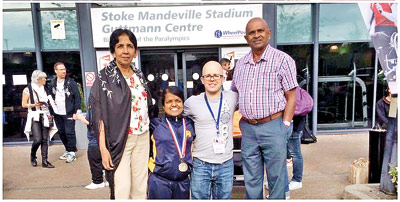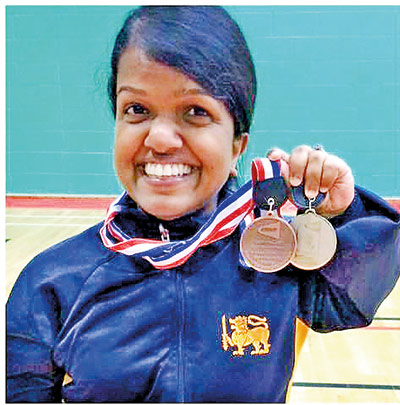Standing tall on and off the court
Randika Doling challenges stereotypes both on and off the courts. Only three feet and 10 inches tall, Doling was born with a genetic condition called achondroplasia which left her with disproportionately short arms and legs.

‘I couldn’t have done it without them’: Randika with her parents and husband Paul
But Doling has never let her stature get in the way of realising her potential.
This September she participated in her first Para-Badminton World Championship and walked away with a bronze in singles and a silver in the women’s doubles with Nina Kersten from New Zealand.
She is now ranked No.4 in the world in her para-badminton category, SS6 (short stature).
In this email interview with the Sunday Times, Doling who now lives in the UK talks candidly about her journey so far, reflecting on the challenges of the sport, the pressing need for Sri Lanka to begin nurturing the talents of its disabled athletes and on the impact winning big has had on her and her family. Below are edited excerpts from the interview:
What was it like to participate in the Para-Badminton World Championships?
To be part of the Para-Badminton World Championships (PBWC) was one of the best experiences in my life. It was played in a world class arena, the birthplace of the Paralympic Movement, Stoke Mandeville, and with the world’s best players.
It had not really sunk in, the magnitude of the event and that I was competing for my country until I got there. There were more than 200 competitors and around 36 countries competing and I was amazed how the popularity of the sport has grown since the announcement last October that badminton would make its Paralympic debut in Tokyo 2020.
You and your husband Paul often play as a mixed doubles pair. As a couple, how has your game developed and how do you complement each other on court?
It’s taken Paul and me awhile to develop as a mixed doubles pair, being husband and wife we knew each other well and we knew each other’s weakness.
We started out blaming each other for losing points and it became difficult for us to continue being a mixed doubles pair.
So we stopped playing as a mixed doubles pair, until recently when our coach said that he would train us to exploit our strengths and hide our weakness and we decided to give it another go.
Since the training we have started to understand each other’s strengths and play according to them.
What are some of the challenges you face when you step onto the courts? What are the physical and emotional demands of competing?
At the PBWC each player I faced had a coach with them in their corner throughout the game encouraging them and giving them tips on how they can win by playing on my weakness.
All the coaches at the tournament were part of each of the country’s support staff. Unfortunately I was the only player from Sri Lanka and I had no support staff.
It was my first international para-badminton event so I was nervous each time I was on the courts and it was easy for me to lose my confidence.
Most of the players I was playing against train at least 4-5 times a week with a professional coach,I only train twice a week and pay for my own coaching so I started to judge my own capabilities (fitness and skills).
Had I trained enough? My husband (an England player) would always be there by my side, encouraging and giving me advice on how to beat my opponent. He isn’t a professional coach, but I should say without him I wouldn’t have got close to winning a medal.
My last game was emotionally demanding. I was so anxious and I had to win my last set to win the game. I had no support except from Paul.
My opponent had her coach and even an experienced player constantly reminding about how to change her game and play on my weakness.

Bringing honour to her country: Randika shows off her medals
There was no one to tell me how to change my game when my opponent started to identify my game and started to change hers. I lost my game to 21-16.
I was indeed gutted as the England coach said ‘you were the better player in that game.’
In the women’s doubles, Nina and I were only beaten by the world’s best pair and against all odds beat the second best doubles pair to win the silver medal.
How does a win at the games continue to affect your everyday life?
Winning medals at the PBWC is a dream come true. It certainly has been a truly remarkable journey from being told that I couldn’t participate in sport at a young age to now becoming the world number four in my para-badminton category, SS6 (short stature).
Every negative comment I have received or negative experience I have suffered has helped me to strive and never give up.
I have now accepted my disability and it is because of my dwarfism that I have had the opportunity to become the world number 4. Life has become easier because of the way I now see myself.
You’ve spoken about the incredible support your family provided you when growing up – what are the ways in which they support you now?
I was extremely grateful to have my parents with me at the PBWC. They flew over from Sri Lanka especially for the event. My father was constantly recording me and my mother was constantly cheering me (no matter how embarrassed I was) which really motivated me to give 110%.
To know I have my family behind me, gives me encouragement and reminds me not to give up. Whilst Chutti (middle sister) joins in the celebrations and shares my achievement, Lokki (older sister) thinks about my next step to help reaching more.
I am blessed to have a balance of strengths from my family. After all, what is the point of winning if you have no family to celebrate it with you?
What do you think Sri Lanka could do to support athletes like you? In what ways do you think the local system fails to do so?
Sri Lanka needs to be identifying talent across the whole nation in disabled sport.
To do so, I feel they should have disabled performance weekends where any disabled person can come along and play sports or even be introduced to new sports.
Coaches and national bodies should be available at these weekends to identify the talent in the players. Sports clubs should also be more inclusive and coaches should be trained to support disabled
athletes.


